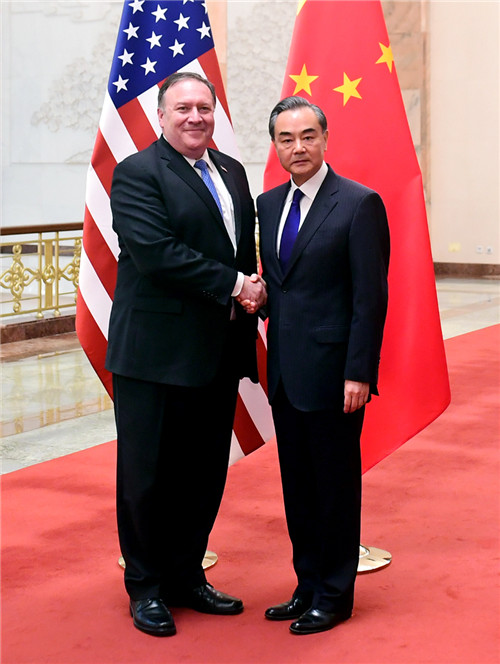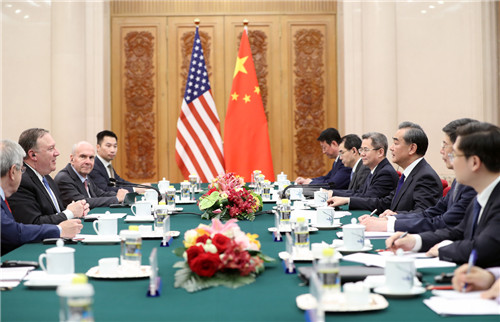
People’s Republic of China



On June 14, 2018, State Councilor and Foreign Minister Wang Yi held talks in Beijing with visiting Secretary of State Mike Pompeo of the United States (US). Both sides exchanged in-depth views on China-US relations as well as international and regional issues of common concern.
Wang Yi expressed that as permanent members of the United Nations Security Council and the top two largest economies in the world, China and the US enjoy extensive and important common interests. The need for bilateral dialogue and cooperation is far more than differences and competition. It is hoped that the US will work with China to well implement a series of important consensuses reached by President Xi Jinping and President Donald Trump at their meeting in Beijing, respect each other, focus on cooperation, and manage and control differences, so as to push forward bilateral relations for healthy development.
Wang Yi said that there are a lot of things China and the US should do and could do in the next stage. The first is to meticulously and well arrange close exchanges between the two heads of state so as to steer and navigate the development of China-US relations. To well grasp the right direction of the development of bilateral relations, both sides should focus on well doing the work in two aspects:
First, constantly add impetus to cooperation. Both sides should well hold the second round of dialogue of the four high-level dialogue mechanisms to promote mutual trust, coordination and cooperation between the two countries in relevant areas. The two countries should properly solve the economic and trade issues through win-win solutions rather than a lose-lose situation and by doing addition rather than reduction. Both sides should expand exchanges and cooperation in bilateral and multilateral areas, including the two militaries, law enforcement, drug control, locality, people-to-people and cultural engagement, as well as counter-terrorism, non-proliferation and public health.
Second, properly resolve the obstacles both sides encounter in cooperation. Both sides should be soberly aware that common interests as well as dialogue and cooperation are the mainstream of China-US relations. Both sides should respect each other's core interests and major concerns, and not let differences and frictions define bilateral relations. It is hoped that the US will abide by the one-China principle and regulations in the three joint communiqués between China and the US, and properly handle the Taiwan-related issues.
Mike Pompeo expressed that the US and China have conducted cooperation in important areas and also are facing some challenges. The US stands ready to, together with China, expand cooperation, cope with challenges and discuss developing long-term strategic relations, in a bid to jointly promote the building of a better world. The US side's stance on the Taiwan question remains unchanged. The US will continue to adhere to the one-China policy.
Mike Pompeo briefed Wang Yi on relevant situation of the summit between the US and the Democratic People's Republic of Korea (DPRK) in Singapore recently. The US spoke highly of the important and active role China has been playing in promoting the settlement of the Korean Peninsula nuclear issue and the successful US-DPRK summit. As there is still a lot of work to do to settle the Korean Peninsula nuclear issue, the US is willing to continue to maintain close communication and coordination with China in this regard.
Wang Yi expressed that the US-DPRK summit in Singapore brought the Korean Peninsula nuclear issue back to the right track of peaceful settlement through dialogue, which is of important historic significance. China welcomes it and supports the US and the DPRK in implementing the consensus reached by the leaders at the summit as soon as possible. China also hopes that other relevant parties and the international community will play a positive role in this regard. As a close neighbor of the Korean Peninsula and an important party, China will continue to play a constructive role in the political settlement of the Korean Peninsula nuclear issue.



